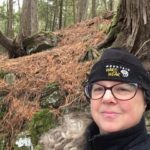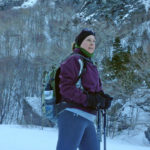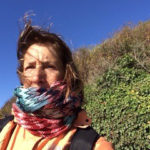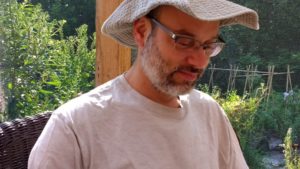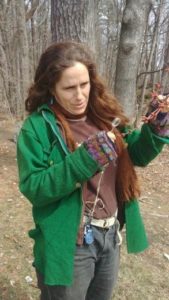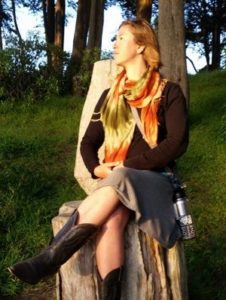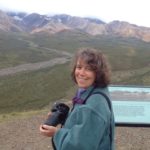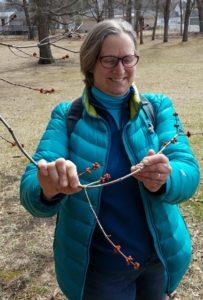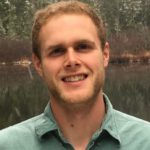Master Naturalist Biographies
Class of 2018
The Vermont Master Naturalist class is a fabulous opportunity to deepen and expand my knowledge of several aspects of the natural world. I’ve been fascinated by the introduction to geology and human impact in the Burlington area. Meeting, working with and learning from such knowledgeable people–both guest speakers and fellow classmates– with different backgrounds and areas of expertise has been so enriching.
Plants are central to many of my favorite things. Walking in the woods, botanizing, herbal medicine, gardening, local food, being in tune with the seasons and the Earth. Spring ephemerals are a particular love. During the course of the class, I’ve been learning more tree ID–it sure takes a lot of practice (for me)! I am used to looking down at the herbaceous plant life.
The project I am working on with Will Lathrop focuses on the South End of the city. Referencing the layer cake approach, we hope to collect cohesive natural history material that will help inform the Department BPRW’s future projects in this part of Burlington and also provide a basis for the 2019 Master Naturalist class to: A) take a field trip in the South End as part of the class, and B) develop with BPRW a guide for the public to the natural communities in the South End.
Diana grew up in the mountains of northern New Jersey surrounded by large state parks, and spent countless hours in the woods hiking, horseback riding and mountain biking. Her favorite place to be is outdoors exploring the beauty of the natural landscape.
Through the Master Naturalist training program, Diana hoped to gain more in-depth understanding of our wild areas in Burlington to better share that fascinating story with the public. Her role as the Marketing & Outreach Manager for the City of Burlington Parks, Recreation & Waterfront provides the perfect opportunity to help connect residents and visitors to our unique and beautiful Urban Wilds through her project with the Master Naturalist program. Though knowledge, we can call better appreciate and care for the environment.
While discovering more about the “layer cake” of natural studies, Diana has discovered where her own interests truly lie – in the human connections to the land that have occurred throughout the millennia and continue through today. While she’ll never consider herself an expert in plants, trees or geology, Diana knows the important roles that natural spaces play in our local ecology and our human lives; and fostering that connection will make our city a better place for all.
Eva was born and raised in New York City. She has had an uncanny love of the natural spaces, a familial “aberration” given her urban upbringing. Eva particularly loves places where the waters meet the land.
As a practicing Psychotherapist,Educator and Somatic Practitioner she explores “patterns”: their development, how they “shape worlds”, and how they support or diminish movement towards greater capacity, resiliency and health.
The belief that knowledge of nature and sense of place is central to regulation of self and community was the inspiration to join the Burlington Master Naturalist Program. “When I know place, the place where I live, my natural home… when I know the smells, the landscape, the birds, the trees… it all becomes a part of me, and I become a part of it.” Intimacy ensues,and with intimacy comes greater regard and attention to stewardship.
Eva is a part of a Burlington Master Naturalist team committed to bringing the community a series of workshops named Urban Wilds and the Arts. This series is an opportunity to explore the landscape, and create art reflecting the the natural spaces. This series of workshops culminate in an exhibit at the Art Hop. Stay Tuned!
Jason grew up in the countryside of Vermont and early on developed an interest in the natural world. He loved spending time exploring woods and fields, climbing trees, investigating waterways, and making connections with these ecological environments and their inhabitants.
He moved to Boston in his early twenties to study music, but after a few years found that he missed his connection with the natural world and returned to Vermont. He now lives in Burlington, teaches physics at UVM and aikido at ACV. In recent years, he has developed interests in permaculture and tree identification.
When he learned of the Master Naturalist program, he thought it was a great opportunity to get to know the “urban wilds” of Burlington more intimately and share that knowledge with others. The project he is working on involves educating others on the natural history of the NNE of Burlington.
“As I learn about the natural history of Burlington, I find that I am looking at familiar places with new eyes. Part of what I enjoy about the Master Naturalist program is making connections with like minded people. The program is a collaborative effort, in that I am learning not just from the leaders of the program, but also from fellow Master Naturalist candidates.”
As a girl, Jess climbed trees, tended plants, and biked through New Rochelle, NY suburban wilds. As a teen after discovering forest meditation, trail running, and backpacking she became a dedicated environmentalist. She studied at Cornell University while exploring wildlands and protesting habitat destruction. Upon graduation she applied what she learned during a year WOOFing across Canada and Mexico to co-manage Dilmun Hill student farm, introducing permaculture and biodynamic practices while engaging Ithaca’s inner city youth with gardening and a neighborhood farm stand.
When she returned from wilderness living, her awe of plants deepened while studying herbal medicine at Sage Mountain and Rooted Wisdom. She expanded her nature awareness through the Kamana program and trained as a wilderness guide in GCC’s Outdoor Leadership program. She served as an outdoor educator, guide, & gardener throughout the northeast until grounding in Vermont to teach Earthcrafts at Orchard Valley Waldorf School where her concurrent permaculture training called her to invite students to explore and rewild the landscape. Simultaneously with Earthwalk she brought nature mentoring into the local public school. Prior experience as a research assistant with a trophic cascade project prompted her to earn a MES & VT middle & high school science teaching license from Antioch New England. She taught in middle and high schools as well as colleges, encouraging ecological literacy and then served as a bioecology researcher for UVM.
Currently she researches fungi’s potential as a watershed pollution remediator while providing earthworks and education through resilience service, Mycoevolve. She volunteers at the Family Room to assist youth with gardens while cocreating outdoor programming to accompany local high school earth science curriculums. She is grateful for the Master Naturalist training and looks forward to continuing to learn about, share in, and tend this diverse landscape with the surrounding community.
My naturalist journey began young. From my first pet of a potato bug I found in my back yard, to exploring the side trails of every campsite my family and I visited as a child, to the geology themed vacations my mom would plan. As a California native, I’ve been lucky enough to be raised on the coastal air and high Sierra mountain tops. My parents are both avid explorers and naturalists who taught me to find comfort in the wilderness. I didn’t even know I was a student of theirs until on a class trip when our leader asked, “Does anyone know what this plant is?” Before I knew I was speaking I said, “Its mint! You can tell by the square stem.” I think I was more shocked than proud that I knew the answer.
My studies of Natural History have ebbed and flowed in the subsequent years. Sometimes its a stack of field guides in my backpack on a day hike, sometimes, its simply up-potting my house plants. Spending time outdoors has remained a constant but how deeply I look and learn has changed. Becoming a student of Western Herbalism has allowed me to see nature through new eyes. I become part of the land as I dig up dandelion and nourish my body by making tea and tincture. I notice when the cottonwoods are budding because thats the best time to infuse oil. Nature has been and continues to be my greatest teacher.
It is due to this deep appreciation and sense of responsibility that I have chosen to be an outdoor leader and nature connection mentor, professionally. I hope to marry this work with the Burlington Master Naturalist program by working to create curriculum which can be used to connect local public school children to the urban wilds of their backyards. It has been a dream and inspiration to learn alongside such intelligent, kind, plant loving, Burlingtonians.
My interest in natural history began with catching critters at summer camp, and has only grown since! After studying Zoology at college I interned at the Schuylkill Valley Nature Center in Philadelphia, learning to teach an appreciation and understanding of the natural world to inner city children. I then worked at the Hale Camping Reservation in Massachusetts with school groups, and as a National Park Ranger Naturalist at the Blue Ridge Parkway based at the Peaks of Otter. After 3 years, I went back to graduate school and pursued a career in Veterinary Medicine for 35 years, with my own house call business that I recently closed. Summers were spent working at the state parks in Ithaca. Although I will continue to work as a relief vet, this will give me time to further my interest in natural history with the Master Naturalist program. In the intervening years, I have maintained this love and often lead wildflower walks at various parks in the spring, and go on educational walks whenever possible. I am also studying field herpetology, and often take field biology classes.
Our project involves reaching out to neighbors of the Arms Forest area in Burlington, leading walks and sharing the natural history, which brings me back to my first teaching experiences! I look forward to learning about this area.
My other interests include hiking, cross country skiing and snowshoeing, canoeing and kayaking, traveling, and working with our therapy dog at the hospital and other locations.
I grew up exploring the woods of suburban CT and southern VT, and have been curious about trees and forests all my life. I studied Forestry and Plant&Soil Science at UVM, graduating in 1979. After doing seasonal landscaping work in VT, I got a Master’s degree from the Conway School of Landscape Design (1985). I worked for a landscape design/build company and then did site planning/project management/permitting for a local civil engineering firm for 15 years. I also did some urban forestry consulting and helped with community tree inventories after the great ice storm of 1998.
I began volunteering with Branch Out Burlington in the late 90’s and represented volunteer tree groups on the state’s Urban Forestry Council for several years. I became a certified Extension Master Gardener after taking the course in 2000. I shared my knowledge of woody plants by teaching that section of the Master Gardener Course in 2005-6.
I also worked as a parent outreach coordinator in the Burlington School district. I helped with outdoor field trips, and worked on tree planting and gardening projects in the schools. I continued to volunteer with Branch Out Burlington and Master Gardeners.
After 4+ decades in Vermont, I continue to love exploring Vermont’s forests, parks, gardens and natural areas, finding spring ephemerals and awesome trees. I also enjoy geocaching as a way to explore the natural environment in a 21st century way. In the Master Naturalist class, I love exploring Burlington’s Urban Wilds (many new to me!) with people who know other aspects of our city’s wildlands – geology, soils, the ground layers, animals, and history. There is so much to see and learn!
My team project focus is the Arms Forest “Urban Wild” – we will lead walks to explore this area for neighbors. I have loved exploring this area and learning in depth about the natural world of this Burlington gem that was a mystery to me.
Will Lathrop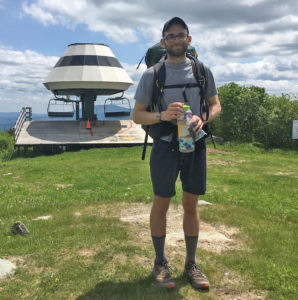
In the summer of 2016, I paddled the Northern Forest Canoe Trail. The route starts in the Adirondack Park and winds across the upper reaches of Vermont and New Hampshire before climbing all the way up Inland Maine. I’d worked in previous seasons as a canoe guide in the Adirondacks, and that work had taught me the value of digging in and becoming familiar with a place. The Northern Forest Canoe Trail dramatically widened my perspective: as I carried my boat between watersheds and over state borders, I felt overwhelmed by all the communities I entered and hurriedly exited. However, I began to develop a sense of how these places were also continuous with one another, connected by myriad processes and common histories. I grew to appreciate both the complexity of each community and the wholeness of the Northern Forest region.
I finished school and moved to Burlington in the summer of 2017. I grew up in central New Jersey, and studied religion and ecological thought at Princeton University. I was grateful to find the Master Naturalist program, which has helped me dig in and become familiar with this city. With this cohort of naturalists, I’m learning to read Vermont’s landscape and to see the complexity and wholeness of wild Burlington. In our community project, Debbie Landauer and I are applying our “layer-cake” naturalist approach to tell a coherent story about the natural history of Burlington’s South End.
I work for the High Meadows Fund, a foundation that supports work in the areas of land use, farm and forest enterprises, and energy across Vermont. I like to write and read poems and watch birds.
Gabe Allen’s life long fascination with the natural world began during a childhood spent wandering in Montpelier’s Hubbard park and hiking and camping all over Vermont with his family. He has spent at least one weekend paddling in Green River Reservoir State Park for as many summers as he can remember. During high school he spent a semester living outdoors full time in Ecuador with a Kroka Expeditions program. After leaving Vermont, he earned a bachelor’s degree in Biology from Skidmore College in Saratoga Springs, NY, during which time he spent a semester studying conservation Biology in South Africa. During and after college, he spent four seasons as a wilderness trip leader all over the Western United States and Europe. Last year, he settled in Burlington, VT, not too far from home. While writing for the Master Naturalists blog, Gabe hopes to use his skills as a writer and student of Ecology to produce thoughtful and readable content about and for Burlington’s conservationist community. Writing about ecology and conservation is something he is passionate about and hopes to continue doing for a long time.
Class of 2017
Candice Holbrook
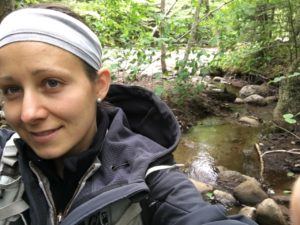 Candice Holbrook, Burlington Parks, Recreation & Waterfront’s Recreation Program Manager, has chosen to become a Master Naturalist to help educate Burlington residents on the natural communities of geology, soils, plants, and animals. She looks forward to passing on the information through programs at summer camps, adult and senior activities, and general walks in the woods with her community. Candice received her Bachelor of Science degree in Recreation from Eastern Illinois University, and her Master of Science degree in Recreation from the University of North Texas.
Candice Holbrook, Burlington Parks, Recreation & Waterfront’s Recreation Program Manager, has chosen to become a Master Naturalist to help educate Burlington residents on the natural communities of geology, soils, plants, and animals. She looks forward to passing on the information through programs at summer camps, adult and senior activities, and general walks in the woods with her community. Candice received her Bachelor of Science degree in Recreation from Eastern Illinois University, and her Master of Science degree in Recreation from the University of North Texas.
Candice’s main project that she will pursue through the Master Naturalist program will be to create an educational program at Burlington Parks, Recreation & Waterfront’s North Beach Campground for campers and beach visitors alike. This program will have a hike-and-learn emphasis with educational talks, experiences, tours, and junior camper activities. Candice believes that the outdoors is our ultimate classroom, and wants to help campers and visitors learn without any boundaries. Campers and visitors of all ages will be intrigued by the educational resources, hands on activities, games, and much more.
Candice has always had an interest in learning more about her outdoor surroundings. She helped plan and participated in many historical walking tours in Illinois over the past few years. These tours included history of events, natural history, and ecology.
Chuck Hulse
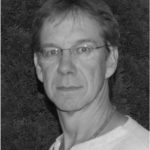 Chuck Hulse, a former biochemist and a retired family physician, completed a master naturalist certificate from Cornell University’s Conservation Education and Research Program. He recently became a Vermont Plant Conservation Volunteer for the New England Plant Conservation Program. He is interested in the health benefits of being in nature and the medicinal biochemistry of natural products. He maintains a photoblog (ChamplainIslandsNature.blogspot.com) highlighting the nature of the Champlain Islands. As a Burlington Master Naturalist, he is helping to develop master naturalist training programs for communities around the Burlington area.
Chuck Hulse, a former biochemist and a retired family physician, completed a master naturalist certificate from Cornell University’s Conservation Education and Research Program. He recently became a Vermont Plant Conservation Volunteer for the New England Plant Conservation Program. He is interested in the health benefits of being in nature and the medicinal biochemistry of natural products. He maintains a photoblog (ChamplainIslandsNature.blogspot.com) highlighting the nature of the Champlain Islands. As a Burlington Master Naturalist, he is helping to develop master naturalist training programs for communities around the Burlington area.
Elise Schadler
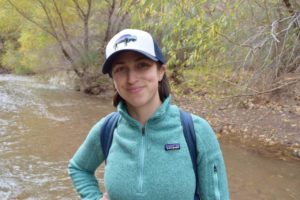 Elise was raised in a mid-Ohio neighborhood appropriately called Woodland, full of tree forts, endless summer capture the flag games, creeks to explore, backyard camping, and regular bike posse adventures. She received her B.A. in Anthropology from Indiana University before joining the Americorps National Civilian Community Corps for a pivotal year of introduction to the country’s varying natural landscapes and myriad social, economic, and environmental issues.
Elise was raised in a mid-Ohio neighborhood appropriately called Woodland, full of tree forts, endless summer capture the flag games, creeks to explore, backyard camping, and regular bike posse adventures. She received her B.A. in Anthropology from Indiana University before joining the Americorps National Civilian Community Corps for a pivotal year of introduction to the country’s varying natural landscapes and myriad social, economic, and environmental issues.
She spent the next three years in the non-profit sector, directing a community-based urban tree planting program in Camden, NJ before eventually venturing north to pursue her M.S. in Natural Resources from the Rubenstein School at UVM. Elise quickly fell for the land, people, and flavors of Vermont. She became the Technical Assistance Coordinator with the Vermont Urban & Community Forestry Program in 2012 and spends her days working with municipal leaders and citizens to be better tree stewards in this magical state. Elise is a Certified Arborist through the International Society of Arboriculture, a licensed Vermont Forester, and a graduate of the Municipal Forestry Institute.
Aside from urban forests, things that particularly excite Elise about the natural world include: tree buds, phenology, land use history, and the human-emotional connection to nature. As part of the Burlington Master Naturalist Program, Elise is helping to celebrate Burlington’s wild places and natural landscapes through a series of art workshops and a community storytelling event in the summer/fall of 2017.
Jacob Holzberg-Pill
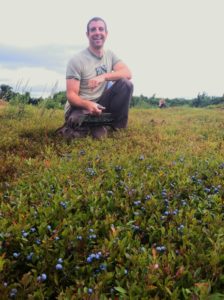 I grew up in the hills of western Massachusetts chasing frogs and climbing trees. (Not much has changed.) My work has focused on empowering individuals and groups through personal connection with the natural world. I have focused on teaching ecology and land stewardship in many different venues, from the high school classroom to the community college to the graduate school seminar. In all these different learning environments, I aspire to promote deep ecological awareness, as well as a solutions-oriented approach when considering the needs of humans and the earth. I hold a M.F. in Ecosystem Management from the Yale School of Forestry and Environmental Studies and a M.Ed. in Ecology and Mentoring from the Harvard Graduate School of Education.
I grew up in the hills of western Massachusetts chasing frogs and climbing trees. (Not much has changed.) My work has focused on empowering individuals and groups through personal connection with the natural world. I have focused on teaching ecology and land stewardship in many different venues, from the high school classroom to the community college to the graduate school seminar. In all these different learning environments, I aspire to promote deep ecological awareness, as well as a solutions-oriented approach when considering the needs of humans and the earth. I hold a M.F. in Ecosystem Management from the Yale School of Forestry and Environmental Studies and a M.Ed. in Ecology and Mentoring from the Harvard Graduate School of Education.
Since Moving to Burlington in September, I have focused on creating educational experiences for my 17-month-old son and becoming involved with land stewardship programs around the city. I am a board member and assistant nursery manager for Branch Out Burlington. I have also taught classes at the Winter NOFA conference, and the UVM Osher Life Long Learning Institute. I am excited to use my Master Naturalist training to teach classes and lead workshops focusing on increasing knowledge, enthusiasm and connection, for Burlington’s urban wilds.
Katie Kruesi
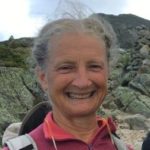 Kate Kruesi, a Vermont Plant Conservation Volunteer for the New England Plant Conservation Program, is a Burlington Master Naturalist with a keen interest in the unusual natural communities of rare plant diversity and the lingering clues of human impact found in Burlington’s Parks and Urban Wilds. She enjoys helping the state botanists, Burlington Parks, Recreation and Waterfront, and neighborhood associations to monitor and manage our rare plant populations, and periodically leads educational walks in Burlington’s natural areas. (She developed educational park signage content for Starr Farm Forest’s sandplain natural community with Remy Crettol for their 2017 project).
Kate Kruesi, a Vermont Plant Conservation Volunteer for the New England Plant Conservation Program, is a Burlington Master Naturalist with a keen interest in the unusual natural communities of rare plant diversity and the lingering clues of human impact found in Burlington’s Parks and Urban Wilds. She enjoys helping the state botanists, Burlington Parks, Recreation and Waterfront, and neighborhood associations to monitor and manage our rare plant populations, and periodically leads educational walks in Burlington’s natural areas. (She developed educational park signage content for Starr Farm Forest’s sandplain natural community with Remy Crettol for their 2017 project).
Katie Michels
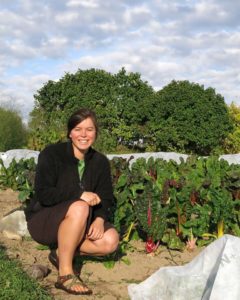 Katie was interested in being a Burlington Master Naturalist as a way of getting to know Vermont better. She grew up in Montana, where she felt at home because she knew the names of most of the plants underfoot and above. Katie has lived in Vermont for 6 years, and felt it was high time to better understand this place, her current home. In the past year’s naturalist explorations, she has focused on learning how to identify trees.
Katie was interested in being a Burlington Master Naturalist as a way of getting to know Vermont better. She grew up in Montana, where she felt at home because she knew the names of most of the plants underfoot and above. Katie has lived in Vermont for 6 years, and felt it was high time to better understand this place, her current home. In the past year’s naturalist explorations, she has focused on learning how to identify trees.
Katie is particularly interested in land use, land conservation, and relationships to place. She currently works for the High Meadows Fund, a Vermont-based foundation that gives grants to support work in the areas of land use, farm and forest enterprises, and energy. She has interned with the Vermont Land Trust, the Montana Land Reliance, and local Vermont farms, and spent two years chronicling the story of Middlebury College’s protection of its Bread Loaf campus. She studied geography and environmental studies at Middlebury College, and lives in Burlington.
As part of the Burlington Master Naturalist Program, Katie is helping to celebrate Burlington’s wild places and natural landscapes through a series of art workshops and a community storytelling event in the summer/fall of 2017.
Mary Ann Samuels
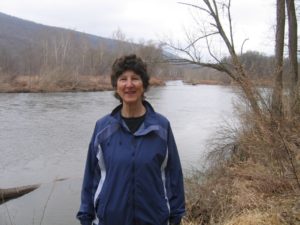 Music has been central to my life. I have taught in public schools and given private lessons for many years. I also perform with “Full Circle”, and sing with the Hospice Choir, “Noyana”.
Music has been central to my life. I have taught in public schools and given private lessons for many years. I also perform with “Full Circle”, and sing with the Hospice Choir, “Noyana”.
I have long maintained an interest in the natural world. I have become especially fond of learning about birds, wildflowers, and trees. The human history of Vermont is also intriguing to me. And through the Master Naturalist Program I have become more interested in geology, the foundation of our natural communities.
I feel so fortunate to be in this program, and to have the opportunity to learn much more about our urban wilds. I hope to become more observant through reading, sitting, drawing, writing and taking photographs. I am interested in the natural world as an inspiration for artistic and spiritual growth. As part of the Burlington Master Naturalist Program, I am helping to celebrate Burlington’s wild places and natural landscapes through a series of art workshops and a community storytelling event in the summer of 2017. I am very pleased to be working with Katie and Elise on this project, and hope our participants will come away with a new appreciation for the nature of Burlington.
Tim Wick
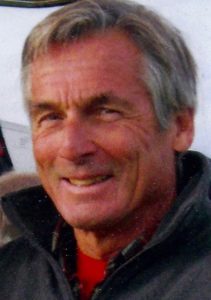 Tim Wick has an extensive background in human ecology; he was director of a small residential school for troubled adolescents and also developed and guided VSAC’s Outreach programs. A key element of those efforts was the desire to help people identify and pursue their chosen path through life. He is passionate about being outdoors in all seasons…bicycling, hiking, paddling, x-country skiing, and exploring all aspects of Lake Champlain. The MVBVT program has both fed his curiosity and piqued his interest in the natural world within Burlington’s city limits. He is helping to refine and enrich the program for the next round of participants and will also continue to introduce community members to their urban wilds through guided walks and field study. He loves rocks and trees.
Tim Wick has an extensive background in human ecology; he was director of a small residential school for troubled adolescents and also developed and guided VSAC’s Outreach programs. A key element of those efforts was the desire to help people identify and pursue their chosen path through life. He is passionate about being outdoors in all seasons…bicycling, hiking, paddling, x-country skiing, and exploring all aspects of Lake Champlain. The MVBVT program has both fed his curiosity and piqued his interest in the natural world within Burlington’s city limits. He is helping to refine and enrich the program for the next round of participants and will also continue to introduce community members to their urban wilds through guided walks and field study. He loves rocks and trees.
Remy Crettol
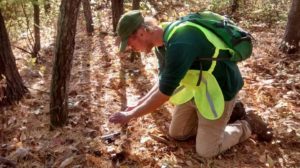 Remy’s curiosity for the natural world began as a child growing up in Connecticut. His mother would regularly take him to visit an ancient oak where she would meditate and he would play under its canopy. As a teenager, he began working at his local Audubon center where he blossomed into a young naturalist. After high school Remy moved to Burlington to attend the University of Vermont where he studied ecology and conservation. He is currently serving the Winooski Valley Park District as their AmeriCorps Environmental Educator and Resource Specialist.
Remy’s curiosity for the natural world began as a child growing up in Connecticut. His mother would regularly take him to visit an ancient oak where she would meditate and he would play under its canopy. As a teenager, he began working at his local Audubon center where he blossomed into a young naturalist. After high school Remy moved to Burlington to attend the University of Vermont where he studied ecology and conservation. He is currently serving the Winooski Valley Park District as their AmeriCorps Environmental Educator and Resource Specialist.
Remy’s passion to continue learning is insatiable. He enjoys exploring natural areas, documenting the species he encounters, and studying different layers of the landscape to understand natural history. He has a sustained interest in wildlife tracking and contributes observations to the Burlington Mammal Tracking Initiative. He recently became a Plant Conservation Volunteer for the New England Wildflower Society to survey and learn more about the rare plant populations in Vermont. As a Burlington Master Naturalist, Remy is using this knowledge to develop educational park signage for a rare sandplain natural community at Starr Farm Forest. He is grateful to have been involved in the Master Naturalist Program because it has strengthened his connection to Burlington’s landscape and given him the opportunity to learn and share his knowledge with the community.
Rowan Cignoni
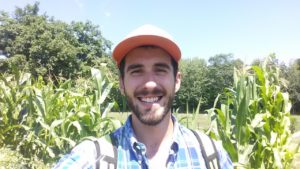 Rowan Cignoni is one of Burlington’s Master Naturalist alumni with a deep interest in the intersections of human social and ecological systems, specifically related to the human impact (both positive and negative) on the landscape, food procurement, and human dignity/sovereignty. In his spare time, he enjoys the multi-faceted benefits of hunting and gathering – including exercise, finding super-local, seasonal, nutrient-dense wild foods, and participating in one’s ecology on a deeply meaningful level. Rowan is involved in the re-establishment of Burlington Permaculture, a community organization that seeks to improve the vitality and resilience of the Champlain Valley’s social and ecological communities through grassroots, whole systems-thinking, with hopes to collaborate with Burlington Parks, Recreation and Waterfront and the Master Naturalist program. He is also working with Dan Cahill, Land Steward at BPRW, to address the over-harvest of the edible fiddlehead, ostrich fern, in Burlington’s silver maple floodplain forests.
Rowan Cignoni is one of Burlington’s Master Naturalist alumni with a deep interest in the intersections of human social and ecological systems, specifically related to the human impact (both positive and negative) on the landscape, food procurement, and human dignity/sovereignty. In his spare time, he enjoys the multi-faceted benefits of hunting and gathering – including exercise, finding super-local, seasonal, nutrient-dense wild foods, and participating in one’s ecology on a deeply meaningful level. Rowan is involved in the re-establishment of Burlington Permaculture, a community organization that seeks to improve the vitality and resilience of the Champlain Valley’s social and ecological communities through grassroots, whole systems-thinking, with hopes to collaborate with Burlington Parks, Recreation and Waterfront and the Master Naturalist program. He is also working with Dan Cahill, Land Steward at BPRW, to address the over-harvest of the edible fiddlehead, ostrich fern, in Burlington’s silver maple floodplain forests.

